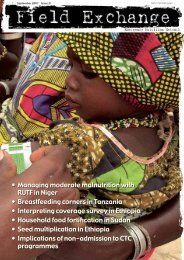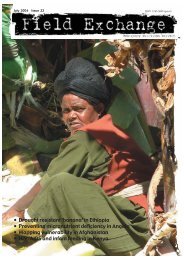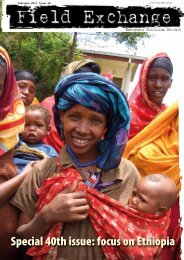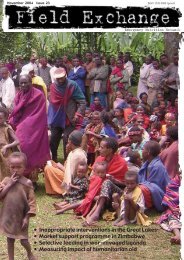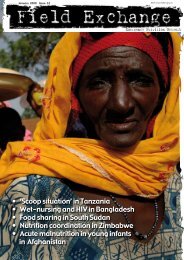Download a PDF of this issue - Field Exchange - Emergency ...
Download a PDF of this issue - Field Exchange - Emergency ...
Download a PDF of this issue - Field Exchange - Emergency ...
Create successful ePaper yourself
Turn your PDF publications into a flip-book with our unique Google optimized e-Paper software.
News<br />
NIE personnel need to know and be able to do,<br />
there is a great deal <strong>of</strong> subjectivity in <strong>this</strong>. As a<br />
result, the NIE courses that exist (including<br />
those provided by the NIERTI) feature different<br />
combinations <strong>of</strong> topics, are <strong>of</strong> varying duration<br />
and involve either no assessment or assessments<br />
that tend to measure knowledge gained<br />
rather than the ability <strong>of</strong> participants to function<br />
effectively. This makes it extremely<br />
difficult to ascertain whether participants <strong>of</strong><br />
NIE courses have the necessary competencies,<br />
and whether the courses themselves are<br />
providing effective training.<br />
One way to address <strong>this</strong> would be to adopt a<br />
more systematic, competency-based approach.<br />
Other sectors in the humanitarian community<br />
have recently moved towards competencybased<br />
training, assessment and recruitment. A<br />
set <strong>of</strong> core humanitarian competencies is now<br />
being used by the CBHA and the child protection<br />
and logistics sectors use standard<br />
competency frameworks to measure the ability<br />
and performance <strong>of</strong> staff.<br />
Preliminary work on developing a competency<br />
framework for the NIE sector<br />
As an addition to the NIERTI, we have taken<br />
initial steps to developing a competency framework<br />
for the sector using the Child Protection<br />
in Emergencies (CPIE) framework as a guide.<br />
The CPIE competency framework is now used<br />
as the basis for recruitment, training and staff<br />
development by a number <strong>of</strong> humanitarian<br />
agencies. The benefits <strong>of</strong> <strong>this</strong> are perceived to be<br />
very positive; one staff member commented<br />
that it had improved recruitment processes and<br />
training and has increased staff motivation and<br />
career progression (K. Bisaro, personal communication).<br />
Research into the identification <strong>of</strong> competencies<br />
for NIE was designed to be as<br />
comprehensive as possible, and was conducted<br />
by reviewing existing competency frameworks,<br />
NIE-related job descriptions, academic and<br />
training course content, and by conducting<br />
interviews with key stakeholders and NIERTI<br />
course participants.<br />
The competencies regarded as essential for<br />
an international emergency nutritionist have<br />
been extracted and compiled into a basic framework,<br />
which we will be publishing shortly. To<br />
increase the usability <strong>of</strong> the framework, specific<br />
Simulation exercise: Cluster<br />
coordination, Thailand course<br />
behavioural indicators have been developed for<br />
each competency at three progressive levels.<br />
These facilitate its use for creating job pr<strong>of</strong>iles,<br />
conducting assessment during recruitment and<br />
training and for staff to identify areas for<br />
pr<strong>of</strong>essional development.<br />
We now have the foundations for a competency<br />
framework for NIE. However, there are<br />
still a number <strong>of</strong> actions required before <strong>this</strong><br />
could serve as a functional tool.<br />
1. More detailed mapping <strong>of</strong> career paths and<br />
job pr<strong>of</strong>iling is required to clarify which<br />
competencies are required at each level<br />
2. The framework needs to be reviewed by the<br />
sector to identify gaps and to agree each <strong>of</strong><br />
the indicators.<br />
3. Finally, the framework will need to be<br />
approved and adopted by GNC member<br />
agencies.<br />
What next for the NIERTI?<br />
The NIERTI will continue to support partner<br />
organisations to run NIE training courses based<br />
on the materials developed and tested during<br />
the pilot phase. We would also like to incorporate<br />
competency-based training and assessment<br />
as part <strong>of</strong> broader efforts to pr<strong>of</strong>essionalise the<br />
humanitarian sector. Having a standard framework<br />
for measuring the competencies attained<br />
by NIE practitioners would help to improve<br />
quality and performance in the sector. In the<br />
meantime, we are keen to maintain the quality<br />
<strong>of</strong> training provided under the NIERTI<br />
umbrella, which will in turn ensure continued<br />
demand and financial sustainability. This will<br />
provide the opportunity for our partner organisations<br />
to continue to strengthen their own<br />
capacity to provide NIE training. Any deterioration<br />
in the reputation <strong>of</strong> NIERTI courses<br />
would have a negative impact on existing<br />
course providers and would jeopardise the<br />
future <strong>of</strong> the initiative. To try and ensure that<br />
quality is maintained, we will continue to<br />
control the use <strong>of</strong> NIERTI training materials.<br />
Any organisation that wishes to run a course<br />
based on these materials will be free to do so, as<br />
long as they can guarantee they will be delivered<br />
to a high standard.<br />
For further information, and to request access<br />
to the materials, please email:<br />
nierti@nietraining.net.<br />
A Perry/NIETN, Uganda, 2011<br />
Minimum<br />
Reporting<br />
Package (MRP) on<br />
Supplementary<br />
Feeding<br />
Programmes<br />
In order to evaluate the quality and impact <strong>of</strong><br />
nutrition interventions, agencies need effective<br />
monitoring and reporting systems in<br />
place for programmes. A retrospective analysis<br />
<strong>of</strong> emergency supplementary feeding<br />
programmes (SFPs) published in 2008 by the<br />
<strong>Emergency</strong> Nutrition Network (ENN) 1 highlighted<br />
inadequate reporting standards and<br />
raised concerns over the quality <strong>of</strong> the interventions<br />
themselves. Based on the study’s<br />
recommendation and funded by the US Office<br />
for Disaster Assistance (OFDA), the ENN<br />
together with Save the Children UK (SC UK), led<br />
the development <strong>of</strong> a monitoring and reporting<br />
guidelines and s<strong>of</strong>tware, guided by a<br />
steering group <strong>of</strong> interested agencies. This<br />
Minimum Reporting Package (MRP) for SFPs<br />
was subsequently piloted in four countries 2 . A<br />
new phase <strong>of</strong> rollout has now begun, funded<br />
by ECHO and led by SC UK. Initiated in the<br />
second half <strong>of</strong> 2011, <strong>this</strong> 18 month project will<br />
see MRP rollout with approximately ten ECHO<br />
implementing partners and involving up to 30<br />
SFPs. An additional module to integrate reporting<br />
for severe acute malnutrition (SAM)<br />
programmes is also being developed to facilitate<br />
reporting where both SFP and SAM<br />
treatment are managed under one intervention.<br />
The overall goal <strong>of</strong> the MRP is to improve<br />
monitoring <strong>of</strong> the performance <strong>of</strong> SFPs implemented<br />
by NGOs and WFP (and WFP partners<br />
where relevant), to enhance programme<br />
management and agency accountability.<br />
Given the different capacities <strong>of</strong> implementing<br />
agencies and contexts within which they work,<br />
the MRP has been configured for two levels <strong>of</strong><br />
usage: essential reporting (adhering to Sphere<br />
Standards) for basic users and optional<br />
advanced reporting for agencies requiring<br />
more information. The MRP also allows reporting<br />
on programme characteristics (e.g. specific<br />
country/area/ programme context) and population-based<br />
statistics (e.g. coverage and<br />
malnutrition rates) to aid interpretation <strong>of</strong><br />
programme performance indicators. <strong>Field</strong><br />
implementation can be tailored to each organisation’s<br />
capacity, adapting to context-specific<br />
challenges in communication and staff training,<br />
including allowing for MRP use in systems<br />
that are mainly paper-based at field level.<br />
A further goal <strong>of</strong> the ECHO MRP project is to<br />
improve understanding <strong>of</strong> the overall efficacy<br />
and effectiveness <strong>of</strong> SFPs through conducting<br />
a final analysis <strong>of</strong> the performance data <strong>of</strong> all<br />
programmes utilising the package during the<br />
project period.<br />
53



